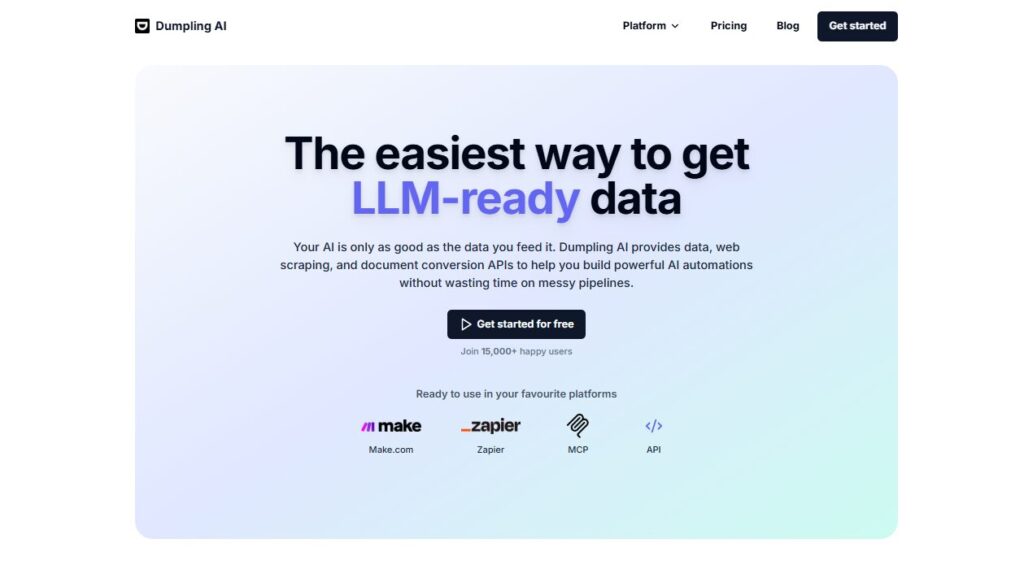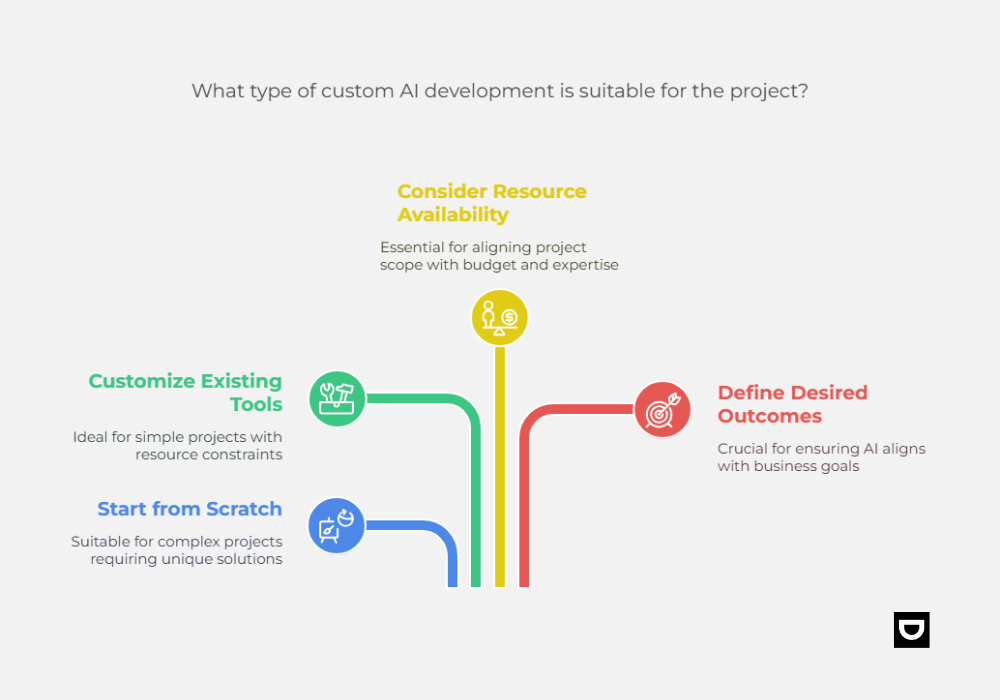Custom AI Solutions: How to Build AI Tools That Fit Your Business Goals
First, let’s talk about what Custom AI Solutions are really about because no, it’s not just slapping “AI” on everything like it’s hot sauce.
You need AI that actually gets your business, and that’s where custom AI steps in, no, I don’t mean some generic chatbot AI, but custom AI solutions with real answers tailored to speak your brand’s tone, and understand your brand’s needs.
Let’s break it all down further in this article.
Key Takeaways
- Knowing that the major API providers like OpenAI, Google Cloud AI, IBM Watson, and Dumpling AI offer ready-to-integrate AI models.
- Consider a developer’s technical skills, industry experience, scalability, and data privacy practices.
- Selecting the right development method depends on project complexity, resource availability, and desired outcomes.
- Understanding the relevant steps for building Custom AI solutions.
- Exploring real-world success stories from Lenovo and Cleary Gottlieb.
What Are Custom AI Solutions About and Why Do They Matter?

Custom AI solutions refer to specialized frameworks designed to address the specific needs of a particular business firm. Unlike most off-the-shelf AI products you are used to, these have been built to fit particular workflows, data patterns, and strategic goals of a given organization.
Custom AI solutions also have advantages for businesses. Tailor-made models can provide refined results that are more accurate, relevant, and efficient. As businesses customize AI models for specific tasks, performance and return on investment can be increased.
Consider, for example, a retail business that develops a specialized AI system that analyzes clients’ purchasing patterns for personalized marketing. Something similar can be done in manufacturing, where an AI might predict when equipment breakdowns will occur, allowing for a reduction in maintenance costs and a decrease in downtime.
Platforms like Dumpling AI that offer strategies for simplifying the development and deployment of personalized AI solutions may further customize the process for optimal results.
What Are the Types of Custom AI Solutions?
Generally speaking, there are two types of custom AI development:
- Configuring Existing Tools: This strategy entails modifying pre-made AI platforms or models to satisfy certain business requirements. Although it is quicker and less expensive to deploy, there might not be as much flexibility available.
- Building from Scratch: Creating AI solutions from the ground up enables total customization and guarantees that the tool precisely matches corporate goals. Although it takes more time and resources, this approach may provide you with a big competitive edge.
The choice between these methodologies is determined by criteria such as money, timeframe, and problem complexity.
Which AI Solutions Should You Build In-House?
Several considerations influence the choice to develop AI solutions in-house:
- Specialized Knowledge: It is advantageous to have established personnel with prior expertise in developing artificial intelligence (AI) tools.
- Privacy: Development offers greater control over creating AI frameworks when proprietary information is included.
- Company Perspective: For businesses that anticipate a deep integration of AI into their operations, internal methods are a good long-term strategy.
Regardless, in-house development takes a significant investment of time, money, and staff.
What Are the Most Common Areas for Custom AI Development?
Here are some of the different types of Custom AI Solutions that exist:
- Predictive Analytics – Implemented in financial services as well as marketing to predict trends and customer actions.
- Conversational AI – In virtual assistants and chatbots that converse with customers and provide services in customer service centers.
- Computer Vision – Used for quality inspection in manufacturing and for diagnostic imaging in health care.
- NLP – Employed for legal document analysis in legal and compliance departments to verify regulations.
These provide examples of varying applications of custom AI technology to solve specific problems for different industries.
Approach to Custom AI Solutions

So what about creating custom AI solutions? Here are a few necessary steps to create and deliver AI solutions that work and can be trusted.
Step 1: Define Business Objectives and Use Cases
First, you need to begin by identifying the specific business challenge or opportunity where your AI model can add value. For instance, is it an AI model that will help in automating customer inquiries, predicting sales trends, or enhancing supply chain logistics.
You need to clearly define your objectives before you commence, as it will help guide you through the development process while ensuring alignment with your business goals.
Step 2: Data Collection and Preparation
Next, you need to gather relevant data from various sources such as databases, CRM systems, or external APIs. After that, you need to ensure your data quality by cleaning, normalizing, and structuring it appropriately with tools like Dumpling AI, which can assist in extracting and preparing the data from diverse formats, including PDFs, images, and web pages.
Step 3: Choose the Right AI Model
This step involves selecting the right AI model that best suits your specific use case, as identified back in step one, with options that include:
- Pre-trained Models: That is with the use of models like OpenAI’s GPT-4 for natural language processing tasks.
- Custom Models: Develop your models from scratch, as they are tailored to your unique requirements, by considering factors like accuracy, scalability, and resource availability when making your choice.
Step 4: Selecting the Most Appropriate Programming Languages and Frameworks
Now, this heavily depends on your individual or team’s expertise and project needs, to choose a suitable programming language and framework, such as:
Python
This is a widely used programming language for AI development due to its extensive libraries, like TensorFlow and PyTorch.
JavaScript
This is a useful programming language, best used for integrating AI functionalities into web applications.
Framework
Lastly, it is also very useful to leverage frameworks such as TensorFlow, PyTorch, or Scikit-learn for your model development and training.
Step 5: Model Training and Evaluation
This step involves training your AI model with the use of an already-prepared dataset. By monitoring the performance metrics like accuracy, precision, and recall to evaluate the model’s effectiveness. You also need to refine the model by tuning hyperparameters and incorporating feedback.
Step 6: Integration with Business Systems
Integrating the trained AI model into your existing business systems and workflows. This may involve developing APIs or using platforms like Dumpling AI, which offers robust API endpoints for seamless integration.
Step 7: Deployment and Monitoring
This step involves deploying the AI solution in a production environment by continuously monitoring its performance and gathering user feedback to identify areas for improvement. Implement updates and retrain the model as necessary to maintain optimal performance.
Leveraging APIs for Custom AI Solutions
APIs play a crucial role in building and integrating AI solutions, as well as providing access to the pre-built functionalities of the AI model, which helps to save development time and resources.

Dumpling AI offers a suite of APIs designed to facilitate AI development: from Data extraction of structured data from websites, documents, and multimedia files, to Document conversion of various document formats into machine-readable text.
It helps to ensure you create custom AI agents capable of performing tasks like lead generation and content creation.
By leveraging Dumpling AI’s APIs, businesses can accelerate the development of custom AI solutions tailored to meet their specific needs.
Custom AI Development: Partner Options & Considerations
When opting to partner with external experts for AI development, consider the following:
- Technical Skills: Check if the partner has experience in AI development.
- Professional Background: A partner with prior experience dealing in your industry is better placed to understand every particular problem that needs to be solved.
- Growth: The answer needs to change to meet heightened business requirements.
- Privacy and Safety: The partner needs to observe applicable policies on data safety and management. (Litslink, Zestminds).
The right partner ensures the success of your project on custom AI solutions.
What Type of Custom AI Development Would Be Suitable for Your Project?

Assessing the following is necessary to choose the best type of AI development:
- Complexity of the Project: While certain severe problems may require starting from scratch, simple projects may profit from customizing already-existing tools.
- Resource Availability: It is always best to ensure you take into account your spending limit, timeline of your projects, and your level of expertise; these are very important.
- Desired Outcomes: It is very important to clearly state your goals and how the use of AI will assist you in achieving them.
With all these thorough evaluations, you can be assured that the chosen approach will align with your business goals and capabilities.
API Providers for Accessing AI Models
When it comes to building with AI, you don’t have to start from scratch, as there are several API providers that can give you access to powerful, ready-to-use models you can plug right into your business.
- OpenAI: With this provider, it lets you tap into advanced language models like GPT-4 to handle things like text generation, summarization, and more.
- Google Cloud AI: This provider offers easy-to-integrate APIs for image recognition, natural language tasks, and analyzing structured data.
- IBM Watsons: This is known for tools that focus on language understanding, speech recognition, and computer vision.
- Dumpling AI: This provider helps businesses stand out by providing something truly tailored for them, from fully customized AI models that fit their specific goals, workflows, and much more.
These options are flexible, scalable, and built to integrate smoothly with most business systems, whether you’re automating your customer service or crunching data at a scale.
Real-Life Examples of Custom AI Implementation
Lenovo’s AI in Healthcare
In order to accelerate scientific research and medical diagnosis, Lenovo and NVIDIA developed custom AI processes. These initiatives have increased healthcare productivity, demonstrating the benefits of tailored AI solutions. (Financial Times).
Legal AI Tools Used by Cleary Gottlieb
To improve its AI capabilities, legal software startup Springbok AI was purchased by law firm Cleary Gottlieb Steen & Hamilton. By making this change, the company was able to streamline processes and create unique AI tools for document analysis and legal research. (Business Insider)
Conclusion
Custom AI solutions are tailored AI frameworks built to meet specific business needs. It also offers more relevant and efficient results than generic AI tools. These solutions improve accuracy, boost ROI, and can be adapted to various industries like retail, manufacturing, healthcare, and law.
There are two main types of custom AI development:
- Configuring existing tools for quicker deployment with limited flexibility.
- Building from scratch, for complete customization and strategic alignment.
Real-world applications in healthcare and legal services demonstrate the tangible benefits of such tailored solutions.
FAQs
What distinguishes custom AI solutions from off-the-shelf AI tools?
Custom AI solutions are specifically designed to meet a business’s unique needs, while off-the-shelf AI tools are generic and may not align perfectly with specific objectives.
How can small businesses benefit from custom AI solutions?
Small businesses can use custom AI to automate tasks, gain insights from data, and improve customer experiences, leading to increased efficiency and competitiveness.
What are the cost considerations for developing custom AI solutions?
Costs can vary based on complexity, data requirements, and development time. However, the long-term benefits often justify the investment.
How does data quality impact custom AI solutions?
High-quality, relevant data is crucial for training effective AI models. Poor data can lead to inaccurate predictions and reduced performance.
Can custom AI solutions be integrated with existing business systems?
Yes, custom AI solutions can be designed to integrate seamlessly with current systems, ensuring smooth adoption and minimal disruption.





